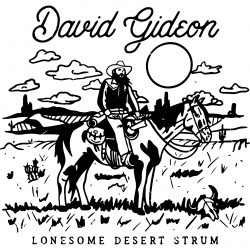A wide-ranging set of songs with its feet firmly in the past but plenty to offer a modern audience.
 David Gideon’s upcoming record, ‘Lonesome Desert Strum’, is due for release on January 28th – that’s 2022! He is described as, ‘The kind of larger-than-life character you’d read about in a Jack Kerouac novel’, being adventure-seeking, well-travelled, a little bit wild, with stories to tell and songs to sing’. I suppose it depends on your view of Jean-Louis and his cast of characters as to how you take that comparison?
David Gideon’s upcoming record, ‘Lonesome Desert Strum’, is due for release on January 28th – that’s 2022! He is described as, ‘The kind of larger-than-life character you’d read about in a Jack Kerouac novel’, being adventure-seeking, well-travelled, a little bit wild, with stories to tell and songs to sing’. I suppose it depends on your view of Jean-Louis and his cast of characters as to how you take that comparison?
‘Lonesome Desert Strum’, is described as mixing, ‘Autobiography, tall tales, and old-school country twang. There are honky-tonk barn burners, campfire ballads, southern slow dances, and rootsy rave-ups’. If that’s a nod to the variety to be found therein then it’s an accurate one.
Gideon grew up between Austin, Key West, and rural Tennessee and spent his summers on ’The Farm’ – an infamous hippie commune, located near Nashville. He eventually headed west, working as a DJ in clubs, a ranch hand in Northern California, and eventually settled in Billy the Kid’s home town – Silver City, New Mexico – where he wrote many of the songs that would later constitute this album, initially recording two self-produced solo albums in New Mexico. Almost every image including the album cover indicates his old-time, rider on the range, cowboy boots roots.
Nashville served as the recording location for, ‘Lonesome Desert Strum’, and joining Gideon in the studio for the album’s creation were Dave Roe (Johnny Cash, Sturgill Simpson), Kenny Vaughan (Marty Stuart, Lucinda Williams), Steve Hinson (George Jones), Billy Contreras (Hank Williams III), Pete Abbott (Average White Band), and Chris Scruggs (Marty Stuart). The album apparently takes its name from guitarist Kenny Vaughan’s description of Gideon’s approach to the instrument in music described elsewhere as, ‘Taking cues from the honky-tonk hell-raisers who came before him, creating a successful brand of American music that nods to classic country without resorting to revivalism or retro–mimicry’. Retro-mimicry; there’s a nice vividly descriptive phrase.
So, how about the music? First up Gideon has a voice that initially seems unremarkable, though closer listening will in all likelihood result in it growing on the listener. It’s recorded sufficiently far forward in the mix for it to be a comfortable and warm listen rather than a strain. ‘Southwestern Skies’ is a good example and there’s a hint of Charley Crockett and Lyle Lovett in there. ‘Red Boots’ may well remind the listener of one of those sprightly, seemingly inconsequential, but charming and wryly amusing tunes that Lovett uses to lighten the space between some of his deeper, darker lyrics; ‘If I had a Boat’ for instance. Slaid Cleaves’, ‘Texas Love Song’ would be another good comparison. There’s always a place for an artist with a sense of humour.
There’s twang aplenty, pedal steel, neat guitar and violin interjections – traditional sounds rather than anything at the cutting edge, but playing that can carry a hint of menace in such as, ‘My Birthday’ – a tale of an unexpected anniversary surprise. ‘Moving to the Country’ is pure Cash with that thumping bass and an amusing opening couplet,
‘Well, I’m moving to the country and I won’t be back till next fall / and if anybody asks I won’t be back at all’.
‘Ashes’, hopefully premature – adds a slightly new twist to the theme of, ‘bury me where’…. In this case, the request is as follows, all done with a feel of the, ‘Tennessee Waltz’,
Scatter some around ol’ Studio B / for Chet Atkins, Harold and Owen Bradley, / Scatter some around Studio A.. / where me and Wood Newton wrote this song one day./ Scatter some down the Natchez Trace / and down by the Ryman, where I found my grace,
There’s a straightforward, heart on the sleeve, love of place that’s very engaging.
The biggest disappointment might be, ‘Crazy Horse’, which feels like a song begging to be written – certainly, it’s a key element of the Western myth. Unfortunately, this track doesn’t quite match the significance and impact of the subject matter,
‘When Custer came / on that warm June day / thinking things would go his way / the people said not today’,
This makes such a key event sound more like a football derby than a significant moment in the history of the nation. The chorus also fails to match the seriousness and importance of the subject, falling into a far too obvious description of a great leader,
‘Crazy is as crazy does / and never another like crazy was’.
But don’t worry, there’s plenty elsewhere that would indicate that Gideon can write a good song and if the gift of storytelling is accepted as a cornerstone of the thing we call Americana then it isn’t a skill learnt overnight – and Gideon has plenty of time to further refine his craft. There’s a lot to enjoy here and on more familiar ground with, ‘A Woman Like Her’, Gideon identifies his own roots and more comfortable ground in a song, as with much of the album, that feels pretty lived in. It’s an interesting view of the female sex but it’s not an inaccurate view of their historic portrayal in country music and how men can treat them,
‘There wouldn’t be no neon lights / No rowdy bar room fights / Or Hank Williams songs drifting through the night / There wouldn’t be no cryin’ shame / No one to take the blame / That life wouldn’t be the same lookin’ back on how we were / There wouldn’t be no Country songs without a woman like her’.



